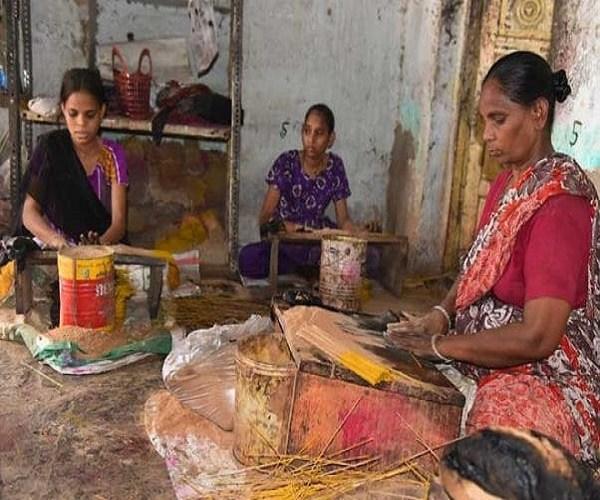The health hazards faced by women working in the Agarbathi (incense stick) industry in Hyderabad, or any similar industry, can be significant. Here are some common health concerns associated with this type of work:

- Respiratory Issues: The production and packaging processes in the Agarbathi industry often involve exposure to smoke, dust, and various chemicals. Prolonged inhalation of these substances can lead to respiratory problems such as coughing, wheezing, asthma, and bronchitis.
- Eye and Skin Irritation: The chemicals and fragrances used in Agarbathi production may cause irritation to the eyes and skin, especially if proper safety measures and protective equipment are not utilized.
- Allergic Reactions: Some individuals may develop allergies to the ingredients used in Agarbathis, such as aromatic oils, gums, and resins. These allergies can manifest as skin rashes, itching, or even more severe allergic reactions.
- Chemical Exposure: Workers involved in dipping the incense sticks into chemical solutions are at risk of exposure to harmful substances. These chemicals can be toxic and potentially lead to long-term health issues if appropriate safety precautions are not followed.
- Musculoskeletal Problems: Repetitive tasks, such as rolling or packaging incense sticks, can result in musculoskeletal disorders like carpal tunnel syndrome, back pain, and joint problems.
To address these health hazards and improve the working conditions for women in the Agarbathi industry, several measures can be taken:

- Training and Education: Provide comprehensive training programs to workers about occupational health and safety practices, including the proper use of protective gear, handling of chemicals, and awareness of potential health risks.
- Ventilation and Air Quality: Improve the ventilation systems in production areas to reduce exposure to smoke and dust. Install air purifiers or exhaust systems to maintain better indoor air quality.
- Personal Protective Equipment (PPE): Ensure that all workers have access to appropriate PPE, such as masks, gloves, safety glasses, and protective clothing, to minimize direct contact with harmful substances.
- Regular Health Check-ups: Conduct periodic health check-ups for workers to identify any emerging health issues early on. This can help in prompt medical intervention and prevent the escalation of health problems.
- Ergonomic Measures: Implement ergonomic practices in the workplace to reduce the risk of musculoskeletal disorders. This may involve providing proper seating arrangements, adjustable workstations, and regular breaks to relieve strain.
- Regulations and Compliance: Enforce existing labor laws and regulations to protect the rights and safety of workers in the Agarbathi industry. Encourage employers to follow ethical practices and maintain a safe working environment.
It’s important for both industry stakeholders and regulatory bodies to collaborate and prioritize the well-being of workers in the Agarbathi industry, particularly women who are disproportionately affected by these hazards. #hydnews #khabarlive
